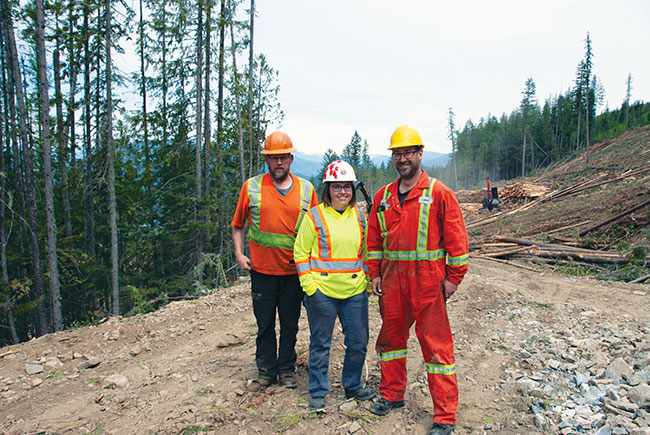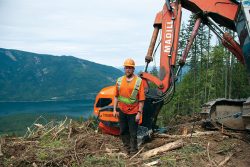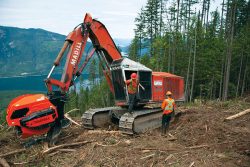
Features
Logging Profiles
Steeper profits: logging with winch assist
B.C. contractor keeps operation small and agile with winch assist
September 2, 2022 By Maria Church
 Brad Schulte (left) stands with Top Down Enterprises owners Roseanna (centre) and Mike Niedziejko (right).
Brad Schulte (left) stands with Top Down Enterprises owners Roseanna (centre) and Mike Niedziejko (right). Brad Schulte, owner-operator of Tor-Kel Contracting Ltd. in the B.C. Interior, knows he’s a small player in a province of forestry heavyweights. That’s the way he likes it.
Growing the seven-machine operation is not a priority. In fact, Schulte would prefer to stay small. Instead, his focus over the past few years was finding and excelling at a niche valued by his employers.
Two years ago, Schulte took a leap of faith and purchased a TimberMAX traction-winch – the second sold in the B.C. Interior – with the goal of accessing the 40 per cent or greater slopes that were previously hand felled or left untouched.
“It’s just something we all have to deal with it: if you don’t adapt you will go away. So you adapt and try different things,” Schulte says. “Nobody else was tethering for our employer at the time.”
Tor-Kel Contracting is a five-person operation logging around 80,000 cubic metres a year for Canoe Forest Products, a plywood mill owned by Gorman Group. Tor-Kel handles the bunching, hoe-chucking, skidding and loading while processing is subcontracted to Crandy Select Logging Services Ltd. and road building is done by Canoe Forest Products.
Canadian Forest Industries joined Schulte and his crew on a block near Canoe, B.C., to get a better look at the TimberMAX in action and discuss the challenges and opportunities with winch assisting in B.C.
“Logging is the same thing, no matter where you go. You just have different variables and you have to figure out how to work with those variables,” Schulte says.
Winch assist
Steep slope logging came into focus for Schulte thanks to some prompting from his employer.
“The mill asked if we were interested. All the low-hanging fruit has been picked and there’s more and more ground like this,” he says, motioning to the slope we clamoured up to get a good view of the winch at work.
Tor-Kel’s TimberMAX, a T20 model, is mounted on a 2001 Madill 3200B feller-buncher carrier – a machine that Schulte says would otherwise be in the scrap yard. Instead, the carrier has put on another 1,500 hours and should run for years with the right maintenance.
Unless it’s being moved, the carrier does not require an operator inside the machine. Instead, the winch is remotely controlled by the operator tethered to it. During our visit, that machine was a 2012 Madill 2850C log loader with a Ridge Runner 7450 tilt undercarriage, and the operator was Schulte’s 23-year-old son Blaine. The tilt undercarriage is a new addition for the Madill that is making a huge difference in operator comfort, Schulte says.
The T20 TimberMAX model has a 17-ton winch pull with an attachment weight of around 6.5 tons. The 7/8-inch cable has a 1,770-foot capacity with a max winch speed of seven km/h. The iWinch control system, mounted in the tethered machine, monitors winch tension, slope gradient, movement, speed, and direction, and includes alarms for low fuel, low engine oil pressure, check engine, over temperature and low hydraulic oil level. A camera on the drum provides a live visual for the operator to ensure the system is operating correctly.
The winch system not only allows Tor-Kel mechanized felling access on the slopes, it’s also a fuel saver – a No. 1 concern for Schulte these days as fuel prices continue to skyrocket, doubling over the past year. He estimates the hoe-chucker, untethered, burns around 40 to 43 litres of fuel an hour. Tethered, both the hoe-chucker and winch carrier burn around the same amount, combined.
Schulte is also a certified hand faller, so he’ll gear up if tethering isn’t an option.
TimberMAX is manufactured in Germany, but the design is home grown. Quebec-based Mathieu Lavoie designed and engineered the first TimberMAX in 2018. The Canadian-designed winches are now operating in the U.S., Chile, New Zealand, Australia, Great Britain, Norway, Germany, and Switzerland, with around 85 per cent of those working in forestry applications. TimberMAX anticipates it will supply its 100th winch by the end of 2022.
What’s working
The recipe for Tor-Kel’s winch assist success is fairly simple: it’s a combination of his relationship with his employer, and the reliability of his dealer.

Brad Schulte owns Tor-Kel Contracting, based in Salmon Arm, B.C., that logs around 80,000 cubic metres a year for Canoe Forest Products
Canoe Forest Products has been a big support for Tor-Kel’s adoption of tethering. Schulte describes scenarios where the mill was flexible and understanding about what fibre is and is not accessible, even with winch assist.
The mill has also made accommodations for increasing contractor costs, fuel prices and a lack of available parts, he says.
Their dealer is the other half of the recipe. The TimberMAX attachment was supplied by Kamloops, B.C.-based Top Down Enterprises. Top Down consulted with Lavoie in the initial design of the TimberMAX and has since supplied more than 30 winch systems in Western Canada.
Top Down Enterprise owners Mike and Roseanna Niedziejko joined us on Tor-Kel’s logging site to chat about the TimberMAX and perform an update on their system.
“We were working with Mathieu since we got started six years ago. We brainstormed and came up with making the winch a standalone instead of an integral part of a machine so it could be used at the top of the hill. We did the protype in the summer of 2018 and we got that working with a local contractor out of Lumby,” Mike says. “It’s grown exponentially.”
He gives full kudos to Schulte for taking on the winch when it was a relatively new product and working with them to iron out the kinks and use it to its full potential.
“He’s very open with different contractors, anywhere in the province. They’ve been able to phone and talk to Brad and he’s given us good reviews. That’s been a huge help for our business growth. It’s far reaching. I’ve been in Chetwynd, or Terrace, Prince George, all over the place, and people will say, ‘Oh yeah, no, I was talking to Brad,’” Mike says.
“We’re just really happy that it’s been working for him,” he says.
Going with the flow
Tor-Kel’s plan to stay small and agile is mainly due to the difficulties in finding new operators. But, according to Schulte, another perk is that he’s juggling fewer factors when it comes to the regulatory changes that are reshaping B.C.’s forest tenure system.

Tor-Kel purchased a TimberMAX traction-winch two years ago to allow for mechanized felling access on slopes in their cutblocks.
“It’s easier for me to manage, because I can manage from the seat of that thing,” he says, pointing to the buncher, “and I’ve only got five guys. That being said, we lost our skidderman this spring because of cancer – he passed away. It’s really hard to find people to fill seats. We got lucky because we found a young guy from Enderby. He’s got experience. But the other guy had 40 years of experience. Bringing the new guy up to speed with the way we do our program is the hard part.”
The owner-operator says he would rather train a new operator with no experience than bring on a seasoned operator who is unwilling or unable to learn how they do things. “With the high cost of everything, it’s all about a flow and efficiencies. You can’t have any wasted moves anymore,” he says.
Family is integral to Tor-Kel. Blaine has been running equipment for his dad since he finished high school, and Schulte says his work ethic and skill are essential keeping the company profitable. Schulte’s wife, Shanna, is the other arm of the company, taking care of the books. Even the company name, Tor-Kel, is a combination of Shanna and Brad’s daughters, Tori and Kelsi.
At 55, Schulte isn’t looking to retire soon, but slowing down is the dream.
“I’d like to go hard for another five years and then get into the three-day week thing, but not sure how Blaine feels about that!” Schulte says with a laugh.
Print this page